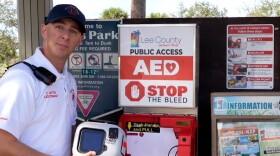Florida is approaching 20,000 confirmed cases of COVID-19. As of the Sunday evening update from the Florida Department of Health, the state reports 19,895 cases and 461 deaths. So far there have been more than 2,600 coronavirus-related hospitalizations statewide.
Nationwide, the U.S. has nearly 531,000 confirmed COVID-19 cases and more than 20,000 deaths. Around the globe, 1.8 million cases have been reported with nearly 111,000 deaths.
Here in Southwest Florida, Lee County continues to lead with 617 confirmed cases and 16 deaths followed by Collier County with 361 cases and four deaths. Manatee County has 236 cases and 13 deaths while Sarasota reports 226 cases and 12 deaths. There have been 113 reported cases in Charlotte County with five deaths. Hendry County has 20 cases and no deaths and in Glades County there have been four reported cases and one death.
U.S. Rep. Vern Buchanan (R-Florida) says his office has been experiencing a flood of phone calls in recent weeks from Southwest Florida constituents with concerns ranging from loved ones stranded on cruise ships to people frustrated with navigating the state's unemployment benefit system.
Buchanan tells the News-Press he's never witnessed anything like what's happening currently with the COVID-19 outbreak.
Florida will soon begin testing asymptomatic people for COVID-19 at sites in Jacksonville, Miami and Orlando. The goal is to better understand how to slow the spread of the novel coronavirus. Gov. Ron DeSantis said the state took over operations, Friday, at the testing centers, which had been supported by the federal government, and began expanded testing.
Florida will be able to offer 800 tests a day, which is a substantial increase from the 250 tests that were available when the federal government supported the sites. Also, the sites have only provided tests to health-care workers, first responders and symptomatic people 65 and older. DeSantis said the Florida Department of Health will develop guidelines, but the goal is to test asymptomatic residents who have had repeated encounters with infected people.
“It’s in the interest of Floridians to continue running those sites, said DeSantis. “So we, the state of Florida, are going to resource all of those sites.”
COVID-19 has rapidly spread across the state and nation, in part spurred by a lack of access to testing and as cases have mounted, there is growing sentiment that the virus is being spread by asymptomatic people.
The number of Floridians filing for unemployment assistance has skyrocketed past 500,000, as the state’s economy grapples with COVID-19 closures. Last week alone, claims flooded in in the hundreds of thousands, according to Gov. Ron DeSantis. “We have a total of 225,755 initial claims that have been filed (last week).”
With so many people accessing the Department of Economic Opportunity’s system and calling the agency, system crashes and hours-long wait times on the phone were commonplace for weeks. DeSantis said 72 computer servers have been added to reinforce the system, which will now allow for 120,000 people to access it at one time.
In the meantime, DEO launched a new site it describes as a “mobile-friendly app.” DeSantis is billing the site as having greater capacity for more users, but the data will still have to go through the main system. “So, people can apply through that and then the data’s going to be migrated through CONNECT,” said DeSantis. “So, they’re working on that, but that site is able to take a much higher volume of people.”
That site can be accessed at FloridaJobsResources.com.
Gov. DeSantis has blamed travelers for bringing the coronavirus to Florida. However, a report over the weekend from the New York Times, found the opposite was also true: In early March, before the state put a stop to large gatherings, people were getting sick here and then carrying the virus with them throughout the country.
“Florida has so many visitors from all over the world, including Europe and New York, which were places where people were getting sick, that the reaction from the governor and other public officials was to call for limiting those visits and restricting or at least tracking the people who were coming here and asking them to quarantine,” said New York Times Miami Bureau Chief Patricia Mazzei.
“But even before then we were seeing people flying back and forth and the virus doesn’t know any borders so of course there were going to be people getting sick in crowds here and then going back home.”
At least 38 people got sick at the Winter Party Festival on Miami Beach in early March and two of them died. People also told the Times they got symptoms of the coronavirus after spending time at Disney World. “The virus is ahead of the public policy makers,” said Mazzei. “Every time local officials, for example, were making decisions about whether to cancel events or keep people home, they were using data that was incomplete if they had data at all. They were sort of making their decisions blindly.”
Mazzei said her reporting offers a lesson for the future: More testing is needed to understand how widespread the virus is so officials can make informed decisions about how to stop it.
The state of Florida has sent a 250-bed field hospital to Lee County in anticipation of a future need in light of the coronavirus outbreak. It will be staged at the Lee County Mosquito Control District in Lehigh Acres until a final location is identified. It is designed to serve as overflow for area hospitals. It is not equipped to serve intensive care or critical patients. The facility will only be set up and opened if the need arises.












